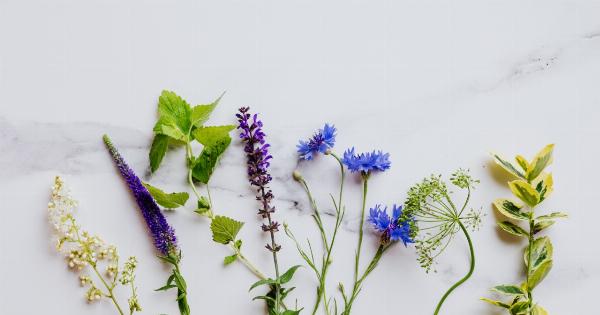The heart is one of the most essential organs in the body. It is responsible for pumping blood and supplying oxygen and nutrients to the rest of the body. Therefore, keeping the heart healthy and strong is crucial for overall wellness.
Several herbs have been identified for their heart-protective properties. These herbs have potent compounds that help maintain a healthy heart and prevent cardiovascular diseases.
1. Garlic
Garlic has been used for centuries as a natural remedy for various health conditions, including the heart. It contains compounds like allicin, which can help to lower blood pressure, reduce cholesterol levels, and prevent blood clots.
These properties help to reduce the risk of heart disease and stroke.
2. Hawthorn
Hawthorn is a flowering plant that has been used for centuries to support cardiovascular health. It contains flavonoids, which help to dilate blood vessels, improve blood circulation, and reduce blood pressure.
Hawthorn also has antioxidant properties that protect the heart against damage caused by free radicals.
3. Ginger
Ginger is a common spice that has potent anti-inflammatory and antioxidant properties. These properties help to lower blood pressure, reduce cholesterol levels, and prevent the formation of blood clots.
Ginger also aids in digestion and may help reduce the risk of heart disease by preventing the accumulation of plaque in the arteries.
4. Turmeric
Turmeric is a spice commonly used in Indian cuisine. It contains an active ingredient called curcumin, which has potent anti-inflammatory and antioxidant properties.
These properties help to prevent damage to the heart and blood vessels and protect against heart disease. Turmeric also helps to lower cholesterol levels and reduce the risk of blood clots.
5. Cinnamon
Cinnamon is a common spice that has been used for centuries for its medicinal properties. It contains antioxidants that help to reduce inflammation and protect the heart against damage caused by free radicals.
Cinnamon also helps to reduce blood pressure and cholesterol levels, which are risk factors for cardiovascular disease.
6. Ginkgo Biloba
Ginkgo Biloba is a herb commonly used in traditional Chinese medicine. It contains flavonoids and terpenoids, which help to dilate blood vessels, improve blood circulation, and reduce the risk of blood clots.
Ginkgo Biloba also has antioxidant properties that protect the heart against damage caused by free radicals.
7. Dandelion
Dandelion is a herb that is commonly used in traditional medicine to support cardiovascular health. It contains compounds that help to improve blood flow, reduce inflammation, and lower blood pressure.
Dandelion also has diuretic properties that help to promote the elimination of excess fluids from the body, which can reduce the risk of heart disease.
8. Arjuna
Arjuna is a herb that is commonly used in Ayurvedic medicine to support heart health. It contains compounds that help to dilate blood vessels, improve blood circulation, and reduce the risk of blood clots.
Arjuna also has antioxidant properties that protect the heart against damage caused by free radicals.
9. Ashwagandha
Ashwagandha is a herb that is commonly used in Ayurvedic medicine to support heart health. It contains compounds that help to reduce inflammation, lower blood pressure, and promote a healthy heart rhythm.
Ashwagandha also helps to reduce stress and anxiety, which are risk factors for heart disease.
10. Red Yeast Rice
Red yeast rice is a type of rice that is fermented with a specific type of yeast. It has been used for centuries in traditional Chinese medicine to support heart health.
Red yeast rice contains compounds that help to lower cholesterol levels, reduce inflammation, and prevent the formation of blood clots. These properties help to reduce the risk of heart disease and stroke.
In conclusion, incorporating these herbs into your diet can help to keep your heart healthy and strong.
However, it is important to consult with a healthcare professional before taking any supplements or herbs, especially if you are taking medication or have a pre-existing medical condition.




























